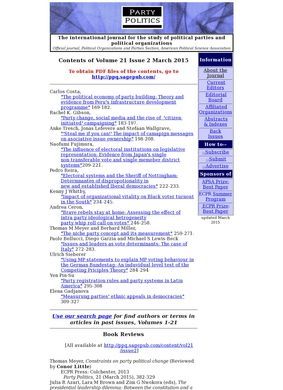The international journal Party Politics, associated with the American Political Science Association, provides important academic insights into the study of political parties and organizations. Volume 21, Issue 2, from March 2015, contains an array of fascinating articles from a range of different authors, exploring diverse aspects of political science.
One of the stand-out pieces in this issue is Carlos Costa's The Political Economy of Party Building: Theory and Evidence from Peru's Infrastructure Development Programme. Costa sheds light on party-building through the lens of Peru's infrastructure development, intertwining politics with economic implications. This provides an encompassing view into the political underpinnings of economic development in a South American context.
Rachel K. Gibson's work on Party Change, Social Media and the Rise of 'Citizen-Initiated' Campaigning explores the changing dynamics of political campaigning in the internet age. With the rise of social media platforms, Gibson highlights the shift towards 'citizen-initiated' campaigning, signaling new avenues for political engagement and challenges for established party systems.
Anke Tresch, Jonas Lefevere, and Stefaan Walgrave's contribution, 'Steal Me If You Can!' The Impact of Campaign Messages on Associative Issue Ownership further delves into the mechanics of political campaigning, this time focusing on the concept of associative issue ownership. The authors scrutinize the efficacy of campaign messages and the strategic elements parties employ to dominate certain issues.
In The Influence of Electoral Institutions on Legislative Representation, Naofumi Fujimura scrutinizes Japan's electoral systems. By contrasting Japan's single non-transferable vote and single member district systems, Fujimura offers important insights into the dynamic between electoral institutions and parliamentary representation.
Pedro Reira's Electoral Systems and the Sheriff of Nottingham is another intriguing study on electoral systems, focusing particularly on established and emerging liberal democracies. He analyses the determinants of disproportionality within these systems, providing an in-depth examination of the intricate dynamics of democratic processes.
Kenny J. Whitby discusses the Impact of Organizational Vitality on Black Voter Turnout in the South, focusing on racial dynamics within political participation. The highlight of this paper is its examination of how the vitality of organizations can influence voter involvement.
Finally, Andrea Ceron's Brave Rebels Stay at Home: Assessing the Effect of Intra-Party Ideological Heterogeneity spots light on the role of ideological variation within political parties. It delivers insightful observations on party dynamics and their effect on the political stance of its members.
Overall, the volume is rich in diversified political thought, covering a range of topics from party-building to electoral systems, representing an important contribution to the field of political science. Its content appeals to a broad audience, including academicians, students, and anyone with an interest in the internal mechanics of political organizations.
